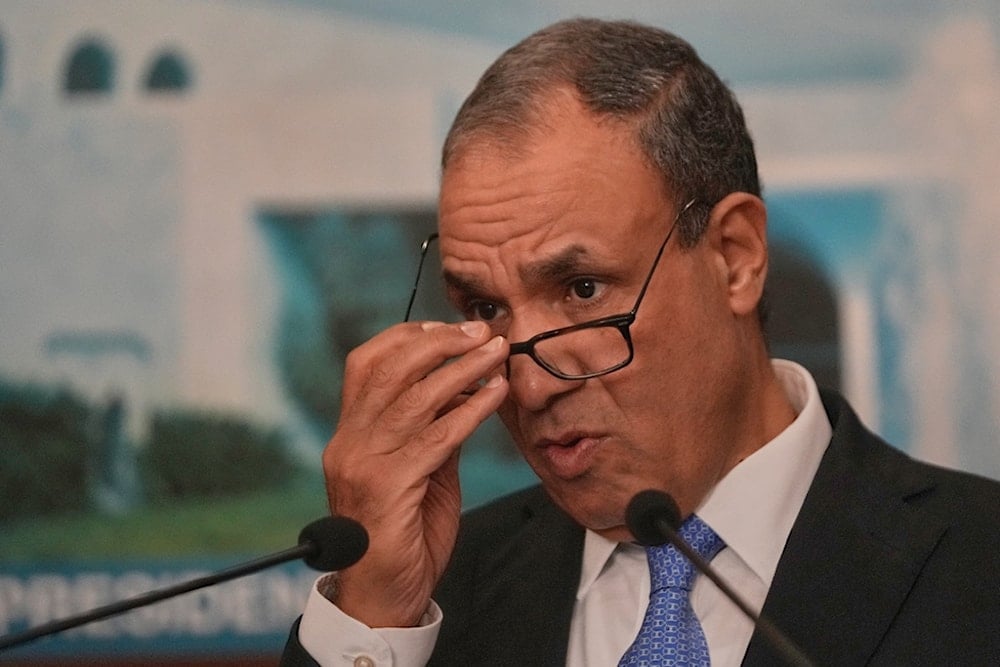Egypt urges halt to Israeli violations, reaffirms support for Lebanon
Egypt’s foreign minister calls for an end to Israeli occupation violations in Lebanon, backing UN Resolution 1701 and initiatives to strengthen the Lebanese Army’s role.
-

Egyptian Foreign Minister Badr Abdelatty speaks during a press conference after his meeting with Lebanese President Joseph Aoun, at the presidential palace in Baabda, east of Beirut, Lebanon, Wednesday, November 26, 2025 (AP)
Egyptian Foreign Minister Badr Abdelatty concluded his meetings with Lebanon’s top state officials on Wednesday without presenting any new initiative to stop the ongoing Israeli occupation’s violations, Lebanese sources told Al Mayadeen’s correspondent in Beirut.
Following his meeting with Lebanese President Joseph Aoun, Abdelatty stressed the urgent need to halt “all violations and breaches committed by Israel against Lebanon, its sovereignty, and the unity and safety of its territory.”
He reaffirmed that Egypt is exerting “intensive efforts to spare Lebanon any dangers or aggressive tendencies that may jeopardize its security and safety,” adding that Cairo’s support “will not stop, because Lebanon’s security and stability are part of Egypt’s own security and stability.”
Abdelatty emphasized Egypt’s full commitment to Lebanon’s stability and the necessity of a complete withdrawal of the Israeli occupation from all Lebanese land, and the full, non-selective implementation of UN Resolution 1701. This, he said, requires an immediate end to all Israeli violations of Lebanese sovereignty, noting that Cairo “supports political and diplomatic solutions, not military ones.”
He warned that “the region as a whole is on the brink of full escalation, which serves no side,” stressing that “the arrogance of force will not achieve security or stability, neither for Israel nor for the region.”
The minister said Egypt is using its regional and international channels to serve de-escalation efforts “through direct or indirect dialogue.”
Support for Lebanese initiatives
Abdelatty expressed full Egyptian support for the initiatives adopted by President Aoun, particularly the recent proposal for the Lebanese Army to assume control over all occupied points in the south, along with Lebanon’s readiness to present a clear timetable to the Quintet Committee.
He also affirmed Egypt’s backing of the Lebanese government’s decision to ensure that arms remain exclusively in the hands of the state, endorsing what he described as the “objective and balanced approaches” Aoun is pursuing to achieve this.
When asked whether Egypt was communicating with Hezbollah, Abdelatty said Cairo “respects the Lebanese decision in all its components,” calling on all actors to rise to the level of responsibility, reduce tensions, and respect Lebanon’s sovereignty and authority.
The Egyptian official pointed out that this is his fourth visit to Lebanon in a year and a half, reflecting the extent of Egypt’s engagement and concern for Lebanese affairs. His trip followed a phone call between Egyptian President Abdel Fattah al-Sisi and President Aoun in which they reviewed the latest developments in Lebanon and the region.
Meetings with Berri and Salam
Abdelatty praised the strong bilateral relations and ongoing coordination between Cairo and Beirut at multiple levels.
During his meeting with Parliament Speaker Nabih Berri, Abdelatty said Egypt “counts on Berri’s wisdom as a pillar of stability.” He reviewed with him the latest initiative regarding southern Lebanon and listened to a detailed explanation of the Lebanese Army’s efforts south of the Litani River.
He added that the state remains committed to advancing the plan north of the Litani after progress is secured in the south. Both sides reaffirmed Egypt’s full support for the ceasefire agreement and the need to halt all Israeli occupation violations in Lebanon.
Abdelatty also met Lebanese Prime Minister Nawaf Salam, where the two discussed conditions in Lebanon, developments in the region, and the situation in the Gaza Strip. The meeting reviewed the bilateral agreements signed under the Lebanese-Egyptian Supreme Committee and ways to accelerate their implementation.
The Egyptian foreign minister stressed continued Egyptian efforts to protect Lebanon, underlining the importance of supporting and enhancing the Lebanese Army’s capabilities to fulfill its missions. Salam, for his part, noted that the Army is carrying out its duties to implement the government’s decisions, including the policy of limiting arms to state institutions, while the Israeli occupation forces continue to violate the ceasefire through daily assaults and the occupation of positions in the south.

 4 Min Read
4 Min Read








